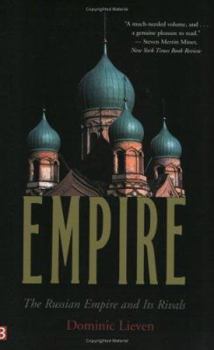Empire: The Russian Empire and Its Rivals
Select Format
Select Condition 
Book Overview
This book explores the role of empire in world history. What does it mean to be an empire? How does one empire differ from another? Why does an empire rise and why fall? Why have empires flourished in... This description may be from another edition of this product.
Format:Paperback
Language:English
ISBN:0300097263
ISBN13:9780300097269
Release Date:September 2002
Publisher:Yale University Press
Length:486 Pages
Weight:0.94 lbs.
Dimensions:1.3" x 5.0" x 7.7"
Customer Reviews
2 ratings
Rambling, but not uninteresting
Published by Thriftbooks.com User , 21 years ago
Dominic Lieven, the historian of Imperial Russia (he is the author a very cogent biography of Czar Nicholas II), has written a long book on a big subject. In spite of the broad title ("Empire"), the book, as suggested by the sub-title, is really a comparison between modern continental European empires (Ottoman, Austro-Hungarian, Russian and Soviet) and a modern Atlantic Empire (British). He also takes a couple of stabs at the Chinese empire, although wisely steers away from making many points about this subject, which is likely to suck in the unwary. He does not attempt a definition of empire as such, and while acknowledging the socio-geographical school of thought (pioneered by Montesquieu and currently incarnated in Huntington), largely steers clear of "German-philosophy-type-First-Principles" and such. This is a relief, because he has much to say just looking at actual facts. Although he concludes that, after the (probably terminal) eclipse of France as a continental great power after the First Empire, the real competition is between Germany and Russia, and that when one is in the ascendant (as was Germany in 1871-1945 and since 1990) the other one is in the relapse (Russia was ascendant between the Vienna Congress and the creation of the German Reich). While his arguments are intuitively appealing, Lieven does not say enough about Germany proper (the "Drang Nach Osten", for example) to support this contention, given that his focus is on the Southern part of cultural Germany, the Austro-Hungarian empire. As a historian of Ukraine, Lieven observes that the Russian heartland is Ukraine and that Russia may not be a great power separated from Ukraine, which raises the ugly likelihood of a future anexation of Ukraine and other neighbouring territories of historical, cultural or military significance by the extant Russia, not unlike what Germany did with the Saarland, the Sudetenland and other regions, prior to invading Poland and precipitating we-know-what. What is clear is that Russia is not likely to remain within its current borders, which have stripped out virtually all territorial gains made by the successive Russian and Soviet Regimes since Peter the Great at least. He points out that Russia has experienced three modernization waves: one, starting with Peter the Great and probably "petering" out with the disappointments of Alexander I and the regression of Nicholas I (i.e., circa 1700 to 1825), the second one starting with the liberation of the serfs by Alexander II and extending to the Soviet times, winding down with the ossification of the regime with Breznev and Andropov after a failure by Kruschev to re-ignite the revolutionary fires (1861-1964), and a third one started by Gorbachov and still apparently in full swing (1985-Present). Given that each renewal was accompanied by a period or Russian Hegemony (the first one culminated during the second half of the XVIII century, under Catherine the Great and the second one in the 1940s and 1950
Within an inch of truth
Published by Thriftbooks.com User , 22 years ago
Lieven's book is a rare animal among the industry of histories explaining Russia and post-Soviet Russia. By putting his main subject within a historical span of several thousand years through including chapters on China and Rome, Lieven throws light on some universal aspects which were common to all empires and those that were unique. That said this book tells more about traditional land based empires (Russia, China, Rome) than examples of emporocratic ones like Britain and Netherlands in the broadest sense. Chapters on "After Empire" show the legacy of Soviet policy towards minority nations and why they failed, this is also interesting in view of break up of communist Yugoslavia which is commented upon in several chapters. Lieven also makes interesting comparisons between Ottoman and Austrohungarian empires.As an overview of what makes an empire an "Empire" and how this idea relates to current European political trends this book is indispensable. Suggested as supplement reading of a thorough historical analysis from an altogether different perspective on imperial idea is Julius Evola's Revolt Against the Modern World.






